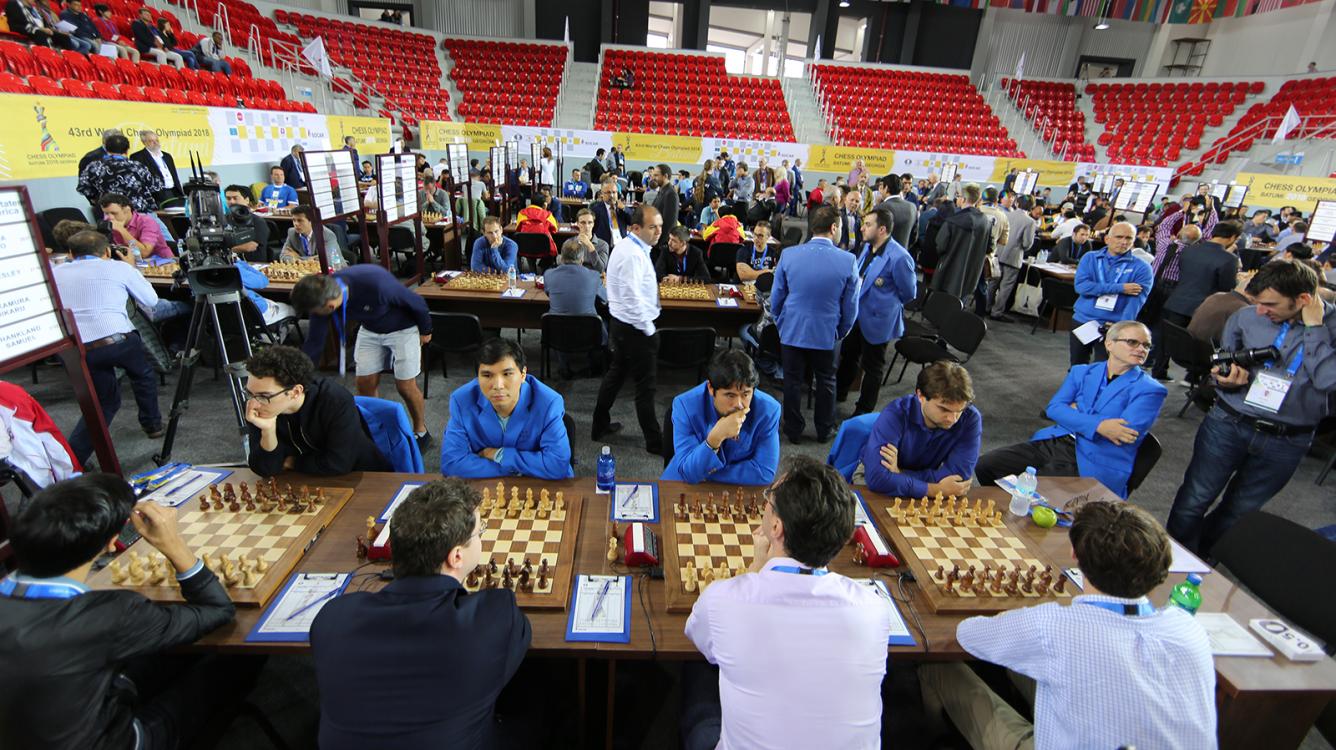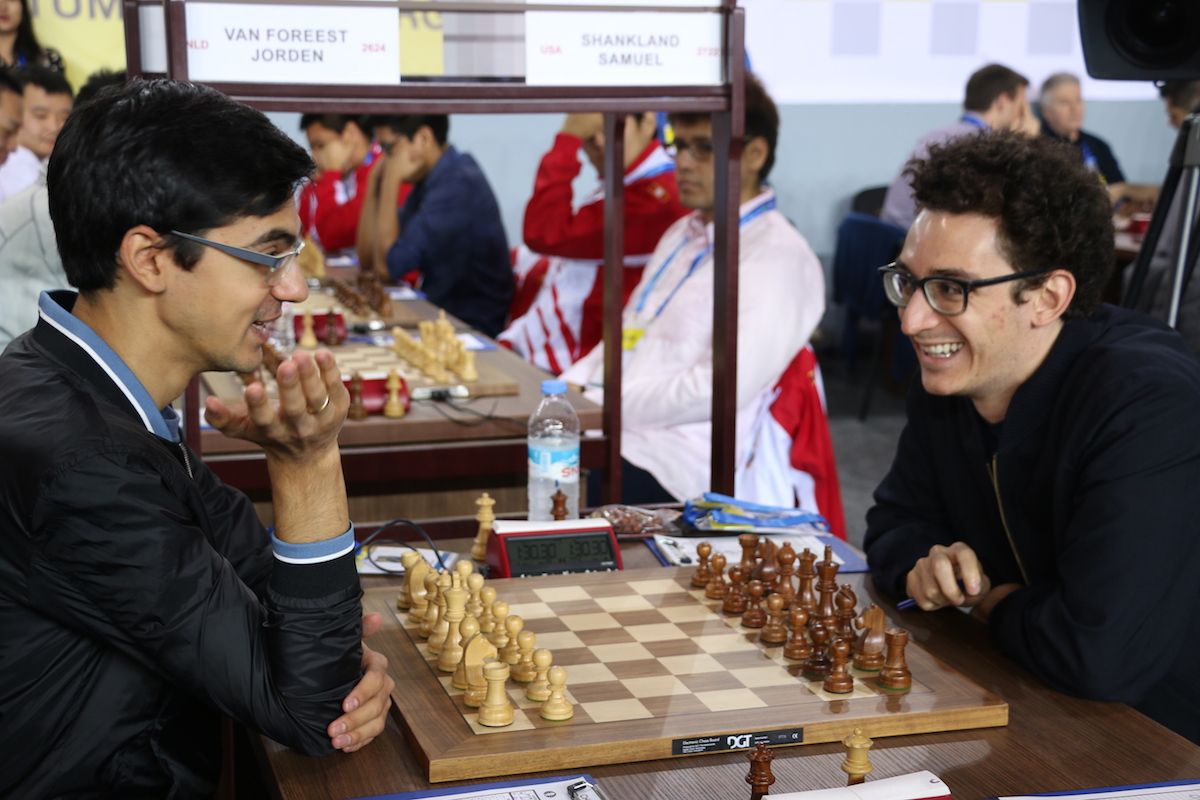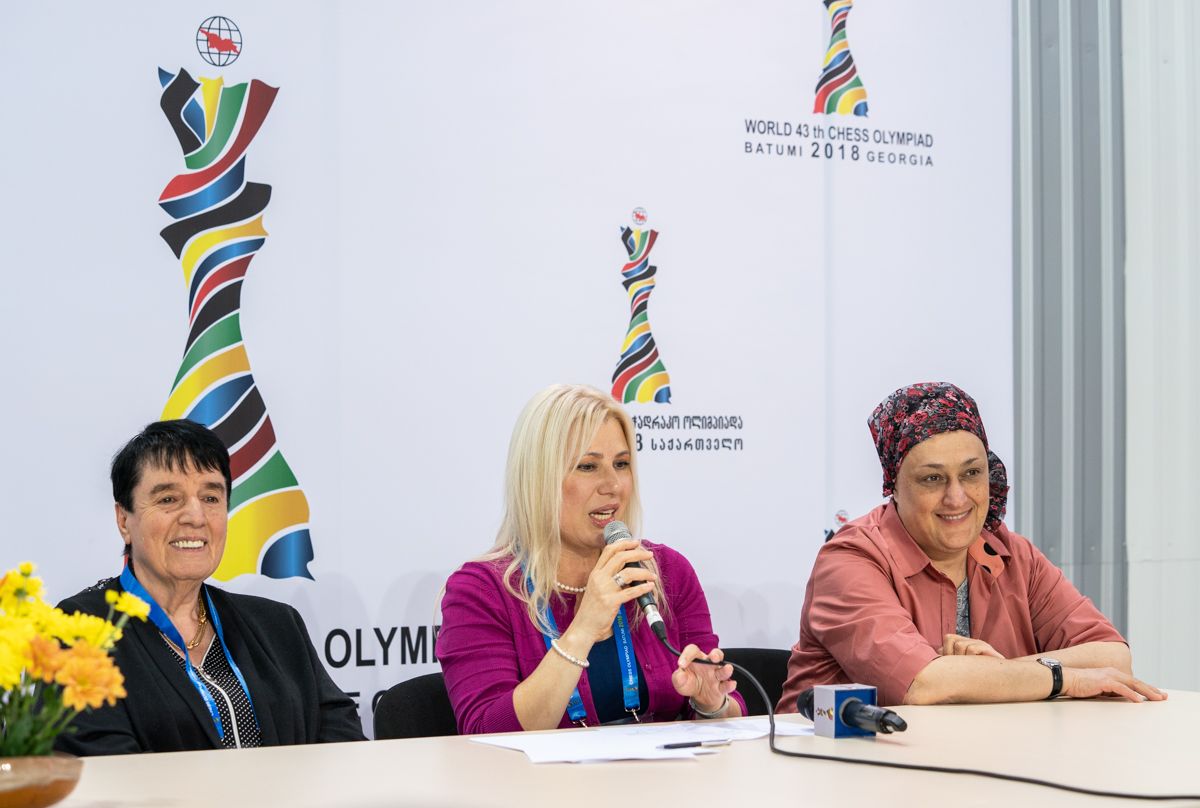
Chess Olympiad: Wesley So Paces Team USA
Round three had something for everyone at the 43rd Chess Olympiad in Batumi, Georgia.
Vladimir Kramnik completed the "Olympiad Slam" by playing board three for the first time, the only position he had never be assigned to play. His win was necessary for a 2.5-1.5 match triumph over Georgia two since Ian Nepomniachtchi's seductive 12.Kd2 got him a good position but he needed to bail some water to hold the final draw.
A still-hobbled Ding Liren entered play for the first time, but his crutches were merely physical as his brain helped China win 3-1 over a pesky Peruvian squad. Viswanathan Anand borrowed from another world champion and branched out with the now in-vogue 3...g6 Spanish, also known as the Smyslov Defense.
Ding Liren still not 100 percent but he’s braving it in round 3 #BatumiChess2018 for his team pic.twitter.com/jHE7Zl70yV
— Mike Klein (@ChessMike) September 26, 2018
Speed Chess Championship hero Jan-Krzysztof Duda went down on board one, but Poland rescued him against Portugal with two wins on lower boards. And Netherlands looked poised to possibly make four draws against USA, but an inexplicable simplification error by wunderkind Jorden van Foreest set up the Americans for a revenge from 2014 and a 3-0 match start.

Alejandro Ramirez (far left) jokes with Hikaru Nakamura, Wesley So, and USA captain John Donaldson before the round. | Photo: Mike Klein/Chess.com.
After all had ended, of the seven teams with a perfect 8-0 game points, none remains spotless now (France is closest with 11.5/12). Only 18 were able to win all three matches, and you can see them below with tomorrow's pairings. (Spoiler alert: USA-India; Azerbaijan-England; Poland-Russia lead the way.)
USA-Netherlands was the top-rated matchup on today's card, and featured the only game between two super-GMs. While Anish Giri and Fabiano Caruana didn't set anything ablaze, Netherlands' fourth board Van Foreest might want to alight something tonight out of frustration.

"Hey, what's your name again?" Frequent opponents Anish Giri and Fabiano Caruana don't show any pressure of the Olympiad. | Photo: Mike Klein/Chess.com.
In a dead-equal ending, the youngster tried to simplify using a fancy method, but it backfired when he trapped his own knight.

Jorden van Foreest made a huge endgame mistake. | Photo: Maria Emelianova/Chess.com.
The chess version of an own-goal goes against what Giri was hoping for. He told Chess.com that he thought his final player was his country's "secret weapon" and that Sam Shankland might have some issues to work through.
"In the company of three greats I think Shankland has an inferiority complex," Giri said. "It's easy to think you are a weak link beside the top players."

Anish Giri thought Sam Shankland might have not recovered from his last match. | Photo: Mike Klein/Chess.com.
While Shankland won an individual gold in the 2014 Olympiad, Giri pointed to what was very nearly a costly final-round loss by Shankland in 2016. He also thought that the recent Chess960 match in St. Louis might have a hangover effect.
"He got molested by MVL," was Giri's description of that match against France's number one.

Sam Shankland: Inferiority complex or team savior? | Photo: Mike Klein/Chess.com.
Giri had also hoped for more from his own game, which he thought gave Netherlands its best hope for a match win.
"On paper of course my board (offered the most chances)," he said about their pre-round strategy. "Plus I have a decent score against Fabi."
After the van Foreest blunder, Wesley So pressed a small advantage and won over Erwin l'Ami, making the final score 3-1 to USA. It didn't reinvent the wheel; match strategy was perfect as it won the two Whites and drew both Blacks easily.
So has clearly earned the confidence of team captain IM John Donaldson. He's 3-0 personally, and all as White. He joked that with that color allotment he must be the captain's favorite, as you can see in the video below:
Russia placed Kramnik on board three for Batumi, the first time he's ever been there at an Olympiad. Making his first appearance in 1992 as an alternate (where he often played board four), he then moved up to board two in 1994 and 1996. See, when you score 9.5/10 for a 2958 performance rating, as only he did as a FM in that first appearance, your team tends to notice. He sat out a few Olympiads and then played six straight as Russian number-one.
"I am playing on any board I am assigned to," he told Chess.com. "Like soldier."
For this round, he got his marching orders: Create pawn imbalances that might give dynamic play.
With draws on the other three boards, Russia needed Kramnik on this day. They also needed Nepomniachtchi to settle the position down and hold after his tempestuous position brought on by 12. Kd2!?
"Our opponent was very strong," Kramnik said. "Both Georgia two and three teams are seriously underrated." He offered more thoughts to Chess.com in this Russian-language interview:
Another former world champion making his mark today was Anand, who said he didn't have a specific reason for returning to the Olympiad after a 12-year hiatus.
"It wasn't any one thing," he said. When Chess.com asked him if he also had the dual role of player and coach, he said, "I barely finish my own preparations! We hang out together and unwind which is nice. I think that's more important than preparation sometimes."
Vidit Gujrathi told Chess.com yesterday that the team has found an Indian restaurant and they've been dining there. Today for an appetizer Anand let yet another past world champion order: The Smyslov Defense.
If that doesn't ring a bell, it might soon. An early ...g6 in the Spanish has already been played by Caruana here in Batumi. Eric Hansen said he knew this as he left his hotel today, but it was the one line he forgot to prepare for, admitting he really didn't know what to do over the board.
Hansen also allowed that he felt added pressure facing a world champion for the first time. It was also the highest-rated player he'd ever faced.
"Once I played passively it went a little bit downhill," Hansen said. "I'm not happy I made it too easy at the end."
"To be honest even I was surprised that my position was even better than it was," Anand said.
Here's Hansen elaborating more on the game and some other Olympiad topics like FIDE elections.
Another board-one worth mentioning is Maxime Vachier-Lagrave, who missed a key deflection tactic and had to scramble to draw against Algerian number-one, GM Bilel Bellahcene. But then he showed some class by actually sacrificing an exchange and winning after a late blunder. Maybe Houdini was French:
Peru scored an upset over China when Jorge Cori outplayed Wei Yi in the middlegame, but China handled everything on the other boards and still won 3-1.
In a late-finishing match, Chess.com Portuguese commentator Krikor Mekhitarian should have won his game against England to cancel out a David Howell win and end the match 2-2, but instead England scoots through with the narrowest of margins. Gawain Jones found a nifty but unlikely fortress.

Gawain Jones found a setup that held in the ending, preserving England's match win. | Photo: Maria Emelianova/Chess.com.
In other close matches, Ukraine needed Anton Korobov's win to get by Romania. Ditto for Armenia's Hrant Melkumyan's win over Turkey and Peter Leko's win over Rustam Kasimdzhanov and Uzbekistan. And the young Iranian squad beat Belarus 3-1 in a match devoid of draws.
| No. | SNo | Flag | Team | Pts. | MP | Res. | MP | Pts. | Team | Flag | SNo |
| 1 | 27 | Vietnam | 10 | 6 | - | 6 | 11½ | France | 7 | ||
| 2 | 10 | Israel | 11 | 6 | - | 6 | 10 | Sweden | 32 | ||
| 3 | 1 | USA | 9½ | 6 | - | 6 | 10½ | India | 5 | ||
| 4 | 15 | Czech Republic | 9½ | 6 | - | 6 | 10½ | Iran | 23 | ||
| 5 | 4 | Azerbaijan | 10 | 6 | - | 6 | 9 | England | 9 | ||
| 6 | 3 | China | 9½ | 6 | - | 6 | 10½ | Croatia | 18 | ||
| 7 | 25 | Greece | 10 | 6 | - | 6 | 8½ | Armenia | 8 | ||
| 8 | 20 | Argentina | 10 | 6 | - | 6 | 8½ | Ukraine | 6 | ||
| 9 | 11 | Poland | 10½ | 6 | - | 6 | 9½ | Russia | 2 | ||
| 10 | 12 | Hungary | 7½ | 5 | - | 5 | 9½ | Germany | 16 |
Twelve out of 151 teams in the women's section started with three wins, including second-seed Ukraine, third-seed China and fourth-seed Georgia one. As we know, Russia surprisingly lost yesterday, and today it was fifth-seed India that dropped a match point.
Playing on top boards, things were looking even more grim for the Indian ladies at some point as both IMs Eesha Karavade and Padmini Rout were in a lost position, and GM Harika Dronavalli's was about equal.

Harika watching Eesha and Padmini's positions, with team captain and Quality Chess owner GM Jacob Aagaard sitting behind. | Photo: Maria Emelianova/Chess.com.
Humpy Koneru won nicely on board one though:

Humpy Koneru. | Photo: Maria Emelianova/Chess.com.
But it was the newlywed Harika who saved the match point as her opponent started to play much too passively.

Harika in full concentration from the early stages. | Photo: Maria Emelianova/Chess.com.
Two other strong teams were close to dropping a match-point as well, but managed to avoid it. Georgia's top team (also in the women's tournament they play with three!) played three draws in its match with France, but it was GM Nino Batasiashvili who scored the crucial win against IM Almira Skripchenko.
For the USA, which played neighbor country Canada, it was FM Jennifer Yu on board four who decide the match after GM Irina Krush had won, but WGM Sabina Foisor had lost her second game, the only team losses so far.
Yu managed to grind down her lower-rated opponent in a rook ending, after a London System had led to a very drawish middlegame.

Match winner Jennifer Yu. | Photo: Maria Emelianova/Chess.com.
China was clearly too strong for Cuba, but on top board IM Lisandra Ordaz almost drew the strongest female player in Batumi: GM Ju Wenjun.

Ju Wenjun. | Photo: Maria Emelianova/Chess.com.
Batumi Olympiad (Women) | Top pairings round 4
| No. | SNo | Flag | Team | Pts. | MP | Res. | MP | Pts. | Team | Flag | SNo |
| 1 | 3 | China | 10 | 6 | - | 6 | 9½ | Uzbekistan | 31 | ||
| 2 | 18 | Italy | 9 | 6 | - | 6 | 10 | Armenia | 12 | ||
| 3 | 28 | Iran | 11 | 6 | - | 6 | 9½ | Mongolia | 17 | ||
| 4 | 19 | Vietnam | 11½ | 6 | - | 6 | 9½ | Georgia 1 | 4 | ||
| 5 | 11 | Azerbaijan | 11 | 6 | - | 6 | 9½ | USA | 10 | ||
| 6 | 2 | Ukraine | 9½ | 6 | - | 6 | 8½ | Slovenia | 35 | ||
| 7 | 13 | Hungary | 8½ | 5 | - | 5 | 9½ | Georgia 2 | 14 | ||
| 8 | 5 | India | 10 | 5 | - | 5 | 8½ | Poland | 7 | ||
| 9 | 24 | Turkey | 10 | 5 | - | 5 | 9 | Serbia | 23 |
(Full pairings here.)
Two big stars of Georgian chess gave a press conference today: women's world champions Maia Chiburdanidze (57) and Nona Gaprindashvili (77). The latter held the highest title from 1962 till 1978, and her successor was Chiburdanidze ("When I was born, Nona was already world champion!") who reigned from 1978 till 1991.
Gaprindashvili played 11 Olympiads for the Soviet Union and one for Georgia; her last was in 1992. She said she still plays chess every day.

Left-right: Nona Gaprindashvili, Susan Polgar, Maia Chiburdanidze. | Photo: Maria Emelianova/Chess.com.
Chiburdanidze played 15 Olympiads, and won nine. She retired in 2012, and played her last Olympiad in 2008. Chess.com asked her if she had considered returning to the team, taking into account that her last published rating (exactly 2500) would put her on board two of the current Georgian women's team.
"Of course I thought about playing, but not for the first team," she said. "I actually had the idea to create a dream team with Nona, Nana Alexandria and Nana Ioseliani, but we couldn’t arrange it."
Chiburdanidze also mentioned an interesting way of avoiding loads of opening theory while still playing regular chess (as opposed to Chess960). She said that a tournament had already been held in Georgia, where each player picks a random position after 10-15 moves, which is equal according to the computer. "The most talented players win, and everyone was happy that preparation wasn’t needed!"
Games via TWIC.
Peter Doggers contributed to this report.
Earlier reports:


